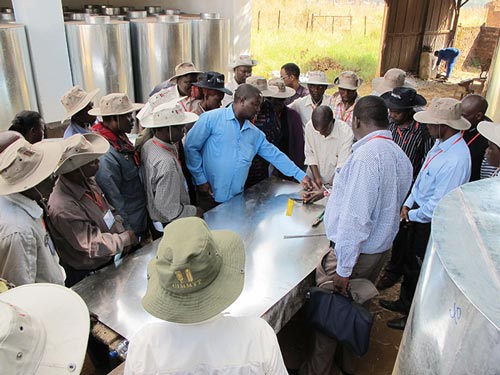 Agricultural extension service staff members in Zambia have been challenged to be the first adopters of metal silos to help promote the technology for effective grain storage. “I implore you, extension workers, to be the first adopters and users of the metal silo technology. As citizens that live side by side with farmers, go and be the first to practice what you will be preaching. You must lead by example,” stated Bert Mushala, the Permanent Secretary, Provincial Administration, Office of the President, Eastern Province, in a speech read on his behalf by his assistant Beenzu Chichuka at the official opening of the Improved Postharvest Management Training Workshop for Extension and Media Personnel held during 27- 28 May 2013 in Chipata, Zambia. “Farmers learn by seeing. Therefore, before they start using the metal silos, they want to see the chief executives, the business executives, extension workers, journalists, and other opinion leaders in the forefront, zealously storing maize in the metal silos,” he added.
Agricultural extension service staff members in Zambia have been challenged to be the first adopters of metal silos to help promote the technology for effective grain storage. “I implore you, extension workers, to be the first adopters and users of the metal silo technology. As citizens that live side by side with farmers, go and be the first to practice what you will be preaching. You must lead by example,” stated Bert Mushala, the Permanent Secretary, Provincial Administration, Office of the President, Eastern Province, in a speech read on his behalf by his assistant Beenzu Chichuka at the official opening of the Improved Postharvest Management Training Workshop for Extension and Media Personnel held during 27- 28 May 2013 in Chipata, Zambia. “Farmers learn by seeing. Therefore, before they start using the metal silos, they want to see the chief executives, the business executives, extension workers, journalists, and other opinion leaders in the forefront, zealously storing maize in the metal silos,” he added.
The purpose of the training was to build technical capacity on hermetic grain storage technologies, such as metal silos and super grain bags, among extension and media staff in the project implementation districts of Chipata and Katete. The workshop intended to create awareness on the importance of grain post-harvest management, help gain insights into different factors affecting post-harvest management, and provide a better understanding of traditional and improved post-harvest technologies and their use in grain loss reduction, summarized Tadele Tefera, CIMMYT entomologist and the Effective Grain Storage for Sustainable Livelihoods of African Farmers Project (EGSP II) coordinator. Ivor Mukuka, EGSP national coordinator for Zambia and ZARI chief agricultural research officer, noted that this was part of the process of sharing information on EGSP as a means of promoting effective grain storage and thus helping smallholder farmers safely keep their grains for longer and sell when the time and price are right.
Reiterating the importance of the technology, Mushala noted that self-sufficiency in food grains in the country does not depend only on increased production and productivity, but also on minimizing losses both in the field and during storage. Over the years, supporting organizations and other partners, including the Ministry of Agriculture and Livestock, have poured colossal amounts of resources into the production component of the sector. “The resultant improved yield gains, especially in maize, have largely been wasted through post-harvest losses,” regretted Mushala, adding that “this project is therefore unique and outstanding to us in Zambia as it focuses on the comparatively neglected storage aspects. It is the first one of its kind and could not have come at a better time.”
Mushala then reminded the journalists that they had an enormous task of educating the masses on the new form of storage as many citizens, even in urban areas, are engaged in agriculture. “Go and empower the masses with this information so that together, we can reduce on-farm storage losses to zero,” Mushala urged the participants. Eastern Province Agriculture coordinator Obvious Kabinda called for commitment: “You must have confidence and belief in the technology if you are to successfully promote it to others.”
The messages did not get lost on the participants. “I have gained good knowledge of the technology and, like other trainees, will be using it to ensure that farmers are aware of its existence, have access to it, and are able to adopt the metal silos,” said Michelo Lubinda, a producer with the Zambia News and Information Services (ZANIS), confirming the usefulness of the workshop.
Tefera thanked the Zambia Agricultural Research Institute (ZARI) and the Ministry of Agriculture for their commitment in implementing the project in Zambia, and the Swiss Agency for Development and Cooperation (SDC) for funding the project.
The training was organized by CIMMYT, ZARI, and the Department of Mechanization, Ministry of Agriculture, and facilitated by Tefera, Mukuka, CIMMYT agricultural economist Hugo De Groote, EGSP policy economist Jones Govereh, and senior mechanization specialist Moffat Khosa and principal agricultural engineer Egbet Munganama from the Department of Mechanization Ministry of Agriculture, Zambia.
 Capacity development
Capacity development 
